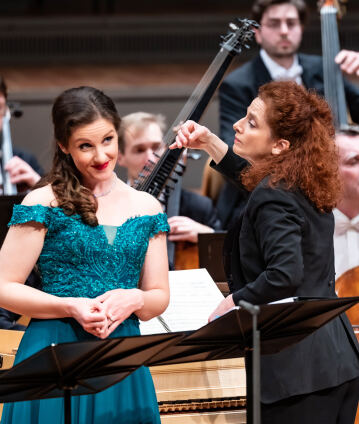Emmanuelle Haïm conducts an early Handel oratorio

We have heard Emmanuelle Haïm several times with the Berliner Philharmoniker as an outstanding interpreter of the music of George Frideric Handel. This time, she conducts his early oratorio Il trionfo del Tempo e del Disinganno (The triumph of Time and Disillusion), a work with intense emotion, delicate arias and operatic ensemble scenes. The story tells of a young person addicted to pleasure who finally realises how fleeting all outward beauty is – a timeless theme.
George Frideric Handel was the epitome of a European composer in the Baroque era: born in Halle, he took up his first post in Hamburg and then spent four years in Italy, where he broadened his musical knowledge. Handel finally found his adopted home in London, where he enjoyed success first with Italian operas and later with English-language oratorios. Following La resurrezione in 2014, Emmanuelle Haïm now conducts the second oratorio from Handel’s Italian creative period: Il trionfo del Tempo e del Disinganno (The Triumph of Time and Disillusion), with the Berliner Philharmoniker.
The oratorio documents the dispute between beauty, pleasure, time and knowledge, who appear in person as allegorical figures. Even if, as the title suggests, time and truth ultimately win the dispute, it is pure – and timeless – beauty that triumphs musically. For example, the oratorio is the origin of one of Handel’s most poignant melodies: the composer later used the aria “Lascia la spina” in other works as well, such as in the opera Rinaldo under the title “Lascia ch’io pianga”. The violin solo in Beauty’s magnificent final song was probably played by the famous violin virtuoso and composer Arcangelo Corelli at the first performance in 1707. At a rehearsal, Handel, who was also inclined to theatrical displays in his own life, is said to have snatched the violin out of his colleague’s hand to demonstrate his stylistic ideas.
© 2023 Berlin Phil Media GmbH
Related interviews
Artists
Our recommendations
- Robin Ticciati’s debut with Mahler’s Fourth Symphony
- Honegger’s “Jeanne d’Arc au bûcher” with Alan Gilbert and Marion Cotillard
- Works by Mozart and Haydn with Adam Fischer and Julia Lezhneva
- Emmanuelle Haïm conducts French Baroque music
- Emmanuelle Haïm conducts Handel’s “Music for the Royal Fireworks”
- Emmanuelle Haïm conducts Handel and Rameau